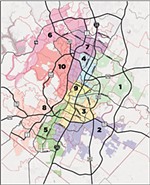Point Austin: Thoughts Between Elections
Reading the outcome before returning to the polls
By Michael King, Fri., Nov. 14, 2014

Although the dust is hardly settled yet – and won't be until at least Dec. 17 – there are a few speculative conclusions to be drawn from last week's municipal election. The first is that shifting from May to November is no turnout panacea. The combination with the general election did more than triple Austin's lamentable recent record, which has been running around 10% (or less) of registered voters in recent years – but 40% (including all ballots) for a city always applauding itself for citizen engagement is not really much to brag about. (Since the national turnout was only 36% – the worst in 72 years – I suppose Austinites still have four points' worth of vanity.)
The real test comes next month – the Dec. 16 run-offs – and maybe we can beat the 9.6% of 2011 voters who returned to vote for Kathie Tovo or Randi Shade. At what limit do roughly 5% of registered voters cross the line from mandate to minuscule?
As I noted, this is a national malaise, and I'll leave it to those of you who did vote to surmise whether it represents a greater portion of apathy or cynicism. Turnout will indeed improve in 2016 (Austin hit 60% in 2012), but it's worth reminding folks that this "historic" 10-1 election provides Austinites much more actual influence on the outcome – and on policies that directly affect their lives – than a vote for Wendy Davis or (in Texas at least) Barack Obama.
Share the Wealth?
Turnout will be heavy on the minds of run-off candidates, as the drop-off will be precipitous and unpredictable. In the mayoral race, Mike Martinez will likely have a tougher time getting his people back to the polls than will Steve Adler, who left the first round with a clear but not insurmountable 37-30% lead. The voting map was starkly polarized down the middle, east and west, and it's no secret that Westsiders historically vote more consistently than Eastsiders – that was one of the reasons behind 10-1, and an additional hill Martinez will have to climb.
It's also no secret that the dividing line is not just geographic, but economic and racial – and Adler is in the awkward position of trying to reach out to all Austinites while relying on a voting base that is whiter and wealthier than the city as a whole. Running from behind, Martinez has gone increasingly negative – Wednesday morning's Barton Springs presser attacked Adler for a largely imaginary connection to Koch Industries – and Adler responded in kind, calling the attack "false, desperate, and disappointing." ("Disappointing" carries just the note of weary condescension likeliest to appeal to that wealthy white base.)
You don't need to be either an Adler or Martinez partisan to be concerned about that deepening division between Austinites – everybody's talking about haves and have-nots, about increasing inequality, about gentrification pushing minorities from the urban core. The more important question is how much either Martinez or Adler – or all the mayor's horses and all the 10-1's men (or women) – can do about it. We live in one of the most prosperous (and most educated) regions in the country, and yet we haven't figured out how to more broadly share that prosperity with all of our neighbors. Both candidates (and the rest of the runner-offers) are promising to solve that problem; both seem to be, at best, working around the margins, and within an increasingly polarized – and politically alienated – electorate.
Losing to Win
There was yet another at-large vote, the firmly defeated rail-and-road transportation proposition (aka Prop. 1, 57-43%). The voting map was not surprising – central city voters generally supported the bonds, suburban voters overwhelmingly opposed them – although there's now a loud follow-up argument (blisteringly in Chronicle forums) over whether the vote was predominantly "anti-tax" or "anti-rail" or "anti-this-rail." I suppose it was some of all three, but since the loudest and best-funded opponents (Citizens Against Rail Taxes) pounded away mightily at the cost, and the reflexive Council candidate buzzword was "affordability," my best guess is the former won the day.
Earlier this year ("Dis Connect," June 13), I described the combination as a "perfect storm" facing Prop. 1, and that amateur meteorology still seems apt. The transit proponents who opposed this plan point to the Austin Community College bond approval as counter-evidence – but that approval stopped cold at the words "tax rate" in the much needed third ACC proposition, over the much easier sell of education. Others suggest that since the (narrowly defeated) 2000 light rail vote (in an entirely different economy and electorate) fared better in inner-city boxes, a pro-transit majority is only waiting to be harnessed by a freshly minted City Council, elected in an anti-transit wave but bearing a spanking New-and-Improved Plan.
Working as I do in a business that thrives on unearned, cockeyed optimism, I wish them the very best of their rosy scenario.
Got something to say on the subject? Send a letter to the editor.












